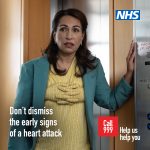Heart and circulatory disease, also known as cardiovascular disease, causes a quarter of all deaths in the UK and is the largest cause of premature mortality in deprived areas. This is one of the biggest areas where the NHS can save lives over the next 10 years.
However, there is evidence that many do not fully understand the symptoms of a heart attack.
While people act upon chest pain, heart attacks manifest themselves in different ways, and people may not recognise other symptoms, such as a squeezing across the chest, sweating, shortness of breath, feeling weak or lightheaded or a feeling of unease.
Even pre-pandemic, there were concerns that people experiencing heart attack symptoms were delaying accessing services – but during the pandemic, research shows that there have been further perceived barriers to accessing services including concerns about Covid-19 and not wanting to burden the NHS.
The NHS ‘Help Us Help You’ Heart Attack campaign aims to:
• increase audience understanding of the symptoms of a heart attack
• increase intention to dial 999 if they see or experience any one of the signs
• increase earlier presentation of heart attacks, leading to earlier treatment, and improved outcomes for patients.
The key target audiences for the campaign are adults 50+ up weighted to C2DE, ethnic minority groups (particularly South Asian and Black groups with high incidence) and adults who may act as a ‘heart attack helper’ by dialing 999 on behalf of someone else.
KEY MESSAGES
Primary
- The early signs of a heart attack can vary, the most common include squeezing across the chest and a feeling of unease
- The early symptoms of a heart attack don’t always feel severe
- It can be easy to dismiss the early signs of a heart attack but it’s never too early to call the NHS and check.
- It’s never too early to call 999 and describe your symptoms
Secondary
Symptoms of a heart attack can include:
- chest pain – a sensation of pressure, heaviness, tightness or squeezing across the chest
- pain in other parts of the body – it can feel as if the pain is spreading from your chest to your arms (usually the left arm is affected, but it can affect both arms), jaw, neck, back and tummy (abdomen)
- feeling lightheaded or dizzy
- sweating
- shortness of breath
- feeling sick (nausea) or being sick (vomiting)
- an overwhelming sense of anxiety (similar to having a panic attack)
- coughing or wheezing
Although the chest pain is often severe, some people may only experience minor pain, similar to indigestion.
While the most common symptom of a heart attack in both men and women is chest pain, women are more likely to experience other symptoms such as shortness of breath, nausea/vomiting and back or jaw pain.
ATTITUDINAL DATA
A new survey of 2000 adults in England has been conducted which highlights current awareness levels around recognising the lesser-known symptoms of a heart attack.
Indicative headlines from the survey include:
- New research reveals that whilst 70% of those surveyed understood that pain in the chest is a symptom of a heart attack, just 41% knew sweating was a symptom and only 27% understood feeling weak, lightheaded or a feeling of general unease were also symptoms.
- New research reveals that 62% would dial 999 if they or a loved one was experiencing commonly known heart attack symptoms, including squeezing across the chest and a feeling of unease, however, this drops to 45% for lesser-known heart attack symptoms including experiencing shortness of breath, sweating and lightheadedness.
- New research reveals that 75% of those surveyed thought a heart attack could be referred to as a cardiac arrest, and 46% did not recognise squeezing across the chest as a symptom of heart attacks.
HEART ATTACK DATA
Between April 2019 and March 2020
• There were over 86,500 people having a heart attack (and admitted to hospital) across England, Wales and Northern Ireland
• In the 1960s more than 7 out of 10 heart attacks in the UK were fatal. Today at least 7 out of 10 people survive
• An estimated 1.1 million people alive in England today have survived a heart attack.



